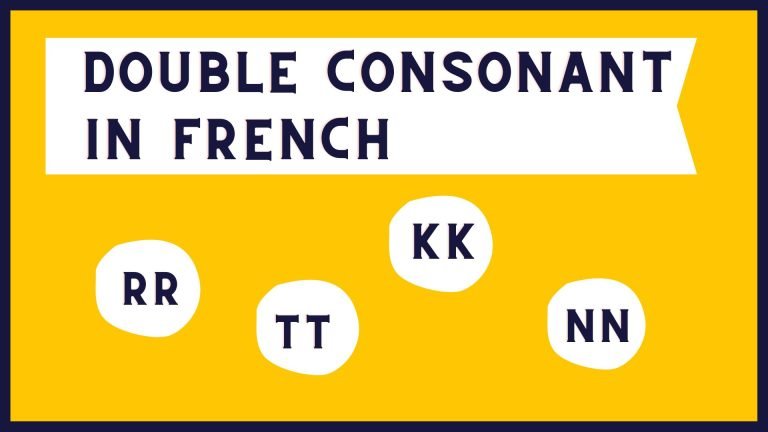Consonant doubling in French phonetic
Updated: 29 December, 2023 by Mylene in Phonetic ▪

Grasping the nuances of French pronunciation is a crucial aspect of becoming proficient in the language, with consonant doubling standing out as a vital component that learners must focus on. In the same vein, it is important to note that French does not have long phonemes, distinguishing it from some other languages. However, there are instances when it may be necessary to pronounce a consonant in a more prolonged manner. This subtle elongation can impact the overall flow and rhythm of the language, contributing to the distinctive melody of spoken French. The following will allow you to discover:
- The pronunciation of double letters
- The future of certain verbs
- The meeting between two consonants in two words
- The meeting of 2 consonants after the fall of the silent e
The pronunciation of double letters
Incorporating this understanding of consonant pronunciation alongside other vital aspects of French phonetics, such as vowel sounds, nasal vowels, semi-vowels, and intonation, can help learners truly grasp the nuances of the language. Additionally, the liaison, a phonetic phenomenon where a normally silent consonant at the end of a word is pronounced before a following vowel sound, plays a crucial role in connecting words and creating the fluidity that characterizes spoken French. As a result, mastering the distinct French sounds and language characteristics will make you be better equipped to communicate effectively and confidently in French.
The significance of mastering consonant doubling is rooted in its prevalence within French spelling and pronunciation. In French, the pronunciation does not change if the written consonant is double. Indeed, the letter is double, but the phoneme is simple, for example:
- soufre is pronounced [sufʁ] (sulfur)
- souffre is pronounced [sufʁ] (suffer)
There is no difference in pronunciation!
- appeler is pronounced [aple] (to call)
- essai is pronounced [ese] (essay)
- immense is pronounced [imɑ̃s] (huge)
There are, of course, some cases in French where long consonants are pronounced accidentally.
the future of certain verbs
In the future of the verbs courir (to run), mourir (to die), conquérir (to conquer), acquérir (to acquire) and requérir(to require) as well as their compounds: encourir (to incur), concourir (to compete), s’enquérir (to inquire), the double spelling R corresponds to a long pronounced [ʁ].
In this article, the long consonant is symbolized by the sign “:”. For example, the long R is represented by [ʁ:].
- je courrai [ku.ʁ:e] (I will run)
- il mourra [mu.ʁ:a] (he will die)
- il acquerra [a.kɛʁ:a] (he will acquire)
- nous requerrons [rə.ke.ʁ:ɔ̃] (we will require)
This pronunciation makes it possible to distinguish the imperfect from the conditional:
- je courais [ku.ʁe] imperfect (I was running)
- je courrais [ku.ʁ:e] in the conditional (I would run)
- j’acquérais [a.ke.ʁe] imperfect (I acquired)
- j’acquerrais [a.ke.ʁ:e] in the conditional (I would acquire)
In the future and the conditional of other verbs such as pouvoir (can), voir (see), envoyer (send), we write a double r, but we pronounce a single r:
- je pourrai [pu.ʁe] future (I will be able)
- je pourrais [pu.ʁe] conditional (I will be able)
- tu verras [ve.ʁa] (you will see)
- il enverra [ɑ̃.ve.ʁa] (he will send)
the meeting between two consonants in two words
In other cases, long consonants arise from the meeting of two identical consonants at the end of one word and at the beginning of the other:
- une note [y.n:ɔt] (a note)
- de la musique classique [my.zi.kːla.sik] (classical music)
- cette table [sɛ.tːabl] (this table)
- par rapport [pa.ʁ:a.pɔʁ] (compared with)
- une robe bleue [yn.ʁɔ.b:lø] (a blue dress)
- quarante-trois [ka.ʁɑ̃.tːʁwa] (forty-three)
The opposition of length often makes it possible to distinguish between different syntactic groups:
- elle a pris [ɛ.la.pʁi] (she took)
- elle l’a pris [ɛ.l:a.pʁi] (she took it)
- pour apporter [pu.ʁa.pɔʁ.te] (to bring)
- pour rapporter [pu.ʁ:a.pɔʁ.te] (to report)
You must pronounce long [t] in the inverted forms of verbs, for example in the direct question:
- Chante-t-elle? [ʃɑ̃.tːɛl] (does she sing?)
- Doute-t-il? [du.tːil] (does he doubt?)
The meeting of 2 consonants after the fall of the mute e
The fall of the mute e often leads to the meeting of two consonants. This can happen:
Inside words, when the fall of silent e is obligatory.
In the future of verbs with stem in -r-:
- nous retirerons: the letter E is not pronounced. The R consonants are side by side. You must therefore pronounce a long R. [rə.ti.ʁ:ɔ̃] (we will withdraw)
- nous retirons [rə.ti.ʁɔ̃] (we withdraw)
- tu entoureras: the letter E is not pronounced. The R consonants are side by side. You must therefore pronounce a long R.[ɑ̃.tu.ʁ:a] (you will surround)
- tu entouras [ɑ̃.tu.ʁa] (you surrounded)
- tu serreras: the letter E is not pronounced. The R consonants are side by side. You must therefore pronounce a long R. [sɛ.ʁ:a] (you will tighten)
- tu serras [se.ʁa] (you squezzed)
In other words:
- extrêmement [ɛk.stʁɛ.mːɑ̃] (extremely)
- netteté [nɛ.tːe] (sharpness)
The meeting of 2 consonants after the fall of the silent e
- tu me manques : The letter E is not pronounced. The M consonants are side by side. You must therefore pronounce a long M.[ty.m:ɑ̃k] (I miss you)
- tu te trompes: The letter E is not pronounced. The T consonants are side by side. You must therefore pronounce a long T. [ty.t:ʁɔ̃p] (you’re wrong)
- on se sauve: The letter E is not pronounced. The S consonants are side by side. You must therefore pronounce a long S. [ɔ̃.s:ov] (we save ourselves)
- pas de doute: The letter E is not pronounced. The D consonants are side by side. You must therefore pronounce a long D. [pa.d:ut] (no doubt)
Embrace Phonetics and Consider Specialized Courses
By paying close attention to the various aspects of French pronunciation and phonetics, including consonant elongation, learners can improve their pronunciation, comprehension, and overall fluency in the language. Practicing these elements regularly in everyday conversations is key to achieving mastery of the beautiful and melodious French language. To fully immerse yourself in the intricacies of French pronunciation, consider taking an online course or booking a private lesson specifically tailored to teach the correct pronunciation techniques. By taking private pronunciation lessons, you’ll receive my expert guidance and structured practice, which can greatly accelerate your progress in mastering the language. As such, gaining a thorough understanding of consonant doubling is of utmost importance for learners seeking to achieve precise and coherent French pronunciation while avoiding mispronunciations and confusion.

